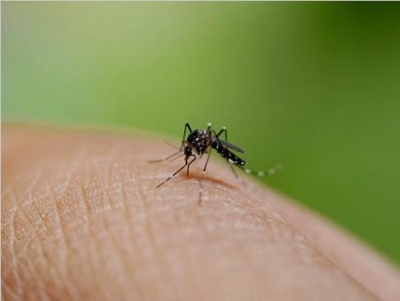Bangladesh: One more person dies due to dengue, 2025 fatalities rise to 115
By IANS | Updated: August 24, 2025 20:15 IST2025-08-24T20:08:16+5:302025-08-24T20:15:26+5:30
Dhaka, Aug 24 One more person has died due to dengue in 24 hours till Sunday morning, bringing ...

Bangladesh: One more person dies due to dengue, 2025 fatalities rise to 115
Dhaka, Aug 24 One more person has died due to dengue in 24 hours till Sunday morning, bringing the total number of deaths from the mosquito-borne disease in Bangladesh to 115 this year.
During the period, 430 more patients were admitted to hospitals with the viral fever, increasing the number of confirmed cases to 28,632 this year, United News of Bangladesh reported, citing the Directorate General of Health Services (DGHS).
The dengue death was reported from the Chattogram Division, according to DGHS.
New cases of dengue reported in Bangladesh were 79 in Chattogram Division, 72 in Barishal Division, 63 in Dhaka South City Corporation, 57 in Dhaka North City Corporation, 54 in Dhaka Division, 46 in Khulna Division, 42 in Rajshahi Division, 12 in Mymensingh Division, three in Rangpur Division, and two in Sylhet Division.
Presently, 1,281 people are undergoing treatment in various hospitals in Bangladesh. A total of 575 people lost their lives due to dengue in Bangladesh in 2024.
Dengue is a viral infection that is spread from mosquitoes to people. Dengue is more common in tropical and subtropical climates than in temperate ones, according to the World Health Organisation (WHO). The majority of people who get dengue do not have symptoms. For those who do, the most common symptoms are high fever, headache, body aches, nausea and rash. The majority of the patients get better in 1–2 weeks; however, some develop severe dengue and need care in a hospital. Dengue can be fatal in severe cases.
Earlier in July, Director General of Health Services Md Abu Jafor stressed dengue's changing nature, which has made it more challenging to conduct treatment of patients, the United News of Bangladesh reported.
While addressing a meeting at the DGHS conference room in Mohakhali, he said: "The current strain of dengue is no longer manageable the way it used to be. Many patients are quickly becoming critically ill."
"More patients are now coming with severe symptoms that require close monitoring and intensive care. In this context, portable ultrasound and bedside haematocrit machines are crucial for quick diagnosis and effective treatment decisions."
He noted that these tools help to carry out clinical procedures faster and reduce complications by enabling faster diagnosis. He advised people to remain vigilant and seek medical attention without delay in case they suffer from fever.
Disclaimer: This post has been auto-published from an agency feed without any modifications to the text and has not been reviewed by an editor
Open in app